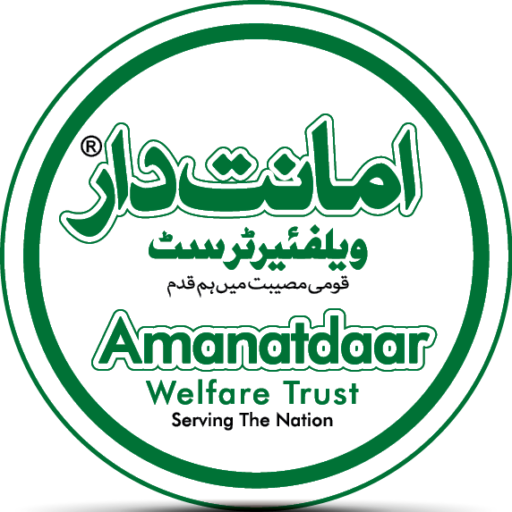Read our FAQs for more information regarding our organization, operations and donations.
Amanatdaar Welfare Trust is a non-profit organization dedicated to improving the lives of underprivileged individuals and communities. It aims to address various social, educational, healthcare, poverty, hunger, and economic challenges faced by marginalized populations.
The trust implements a range of projects and initiatives focused on providing education, healthcare, vocational training, relief assistance, food/ration, and community development. It supports the less fortunate to become self-reliant and lead better lives.
You can contribute in various ways, such as making a donation, sponsoring a child’s education, volunteering your time and skills, fundraising, or spreading awareness about the organization and its work.
Yes, amanatdaar welfare trust has tax exemption certificate of 2(36).
Amanatdaar welfare trust is registered under The Trust Act 1882 in Pakistan.
Yes, Amanatdaar Welfare Trust is a registered charity organization, recognized and authorized to operate for charitable purposes.
The trust engages in various charitable activities, including providing education scholarships, healthcare services, and relief assistance during emergencies, vocational training programs, poverty and hunger combating programs and community development initiatives.
Amanatdaar Welfare Trust follows a rigorous and fair selection process to identify beneficiaries. The trust’s team conducts surveys, assesses needs, and considers socio-economic factors to ensure aid reaches those who genuinely require assistance.
Donations can be made securely through our website’s online payment gateway or by following the instructions provided on the donation page. Your financial information will be handled with utmost security.
Yes, Amanatdaar Welfare Trust may accept in-kind donations such as clothing, books, medical supplies, and other relevant items, subject to their current needs and requirements.
Amanatdaar Welfare Trust Account Details are given below:
𝐏𝐀𝐊𝐈𝐒𝐓𝐀𝐍
Account Title : Amanatdaar Welfare Trust
Bank Name : Soneri Bank Limited
Account No : 20008326917
Swift Code : SONEPKKA
IBAN No : PK10SONE0003120008326917
Important: Share your payment bank receipt screenshot via WhatsApp: +92 333 2823204
Yes, you can donate to multiple campaigns via Donation options available on our website.
At Amanatdaar, we prioritize the security of our donors and ensure that your payment details remain protected whenever you contribute through our platform. Rest assured, we do not store your debit/credit card information on our servers (for subscriptions it is stored with our payment processor Stripe securely); it is securely held by your respective banks.
Yes. All your donations are tax deductible in Pakistan. After you make a donation, amanatdaar welfare trust sends you a tax-deductible receipt. We have been granted exemption from income tax under section 2(36) of the income tax ordinance 2001.
The trust has a robust financial management system in place, with regular audits and oversight to ensure that donated funds are utilized solely for the intended charitable activities and projects.
The trust maintains transparency by regularly sharing updates on its website for annual and audit reports, social media platforms, and newsletters, highlighting the progress of ongoing projects and the utilization of funds.
Yes, the trust welcomes volunteers who are passionate about making a positive impact on society. Volunteers can help with organizing events, teaching, healthcare services, and various other activities.
Yes, our objective is to become financially sustainable over the next few years through corporate partnerships and government adoption.
The trust has a robust financial management system in place, with regular audits and oversight to ensure that donated funds are utilized solely for the intended charitable activities and projects.
Yes, Amanatdaar Welfare Trust is a registered charity organization, recognized and authorized to operate for charitable purposes.
The trust engages in various charitable activities, including providing education scholarships (under Taleem Pakistan Schooling program), healthcare services, and relief assistance during emergencies, vocational training programs, poverty and hunger combating programs and community development initiatives.
Amanatdaar Welfare Trust follows a rigorous and fair selection process to identify beneficiaries. The trust’s team conducts surveys, assesses needs, and considers socio-economic factors to ensure aid reaches those who genuinely require assistance.
Zakat is one of the five pillars of Islam and refers to the obligatory charity or almsgiving that every adult Muslim who possesses wealth above a certain threshold (Nisab) must pay annually to assist the needy and less fortunate.
Muslims who possess wealth above the Nisab threshold for one lunar year are obligated to pay Zakat. This includes savings, investments, gold, silver, and business assets.
The Nisab threshold is the minimum amount of wealth a Muslim must possess before Zakat becomes obligatory. It is calculated based on the current market value of silver or gold. The exact amount may vary, so it’s advisable to consult with knowledgeable scholars or local authorities.
Zakat is due on assets that are held for investment or savings purposes, including cash, gold, silver, business inventory, stocks, and agricultural produce.
Certain categories of people are exempt from paying Zakat, such as those who do not possess wealth above the Nisab threshold, minors, and individuals who are in debt beyond their assets.
Yes, Zakat can be paid in advance of the due date, provided the wealth has been held for a full lunar year and meets the Nisab threshold.
The standard rate for Zakat is 2.5% (or 1/40) of the total wealth that has been held for a full lunar year and exceeds the Nisab threshold.
Zakat becomes due after one lunar year has passed since the wealth reached the Nisab threshold. It should be paid as soon as possible after this date.
Zakat serves as a means of purification of wealth and a reminder of the responsibility Muslims have towards the less fortunate members of society. It promotes social justice, solidarity, and compassion within the community.
You can donate Zakat to our following programs (Click on programs to visit):


Subscribe to our Newsletter. We promise not to spam you!